 Petzlover
Petzlover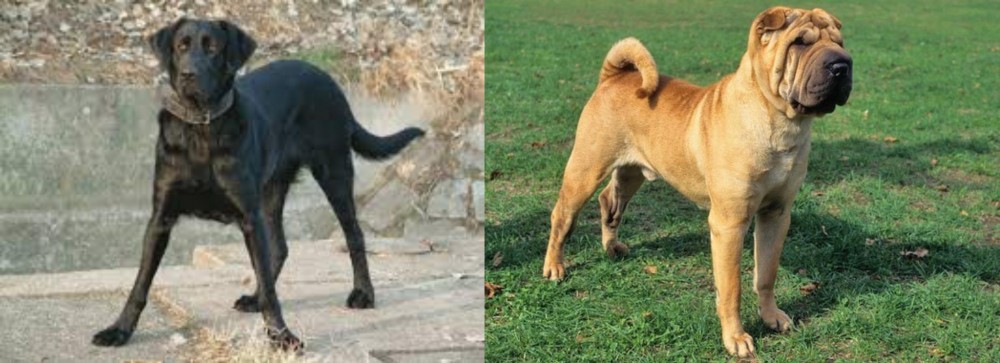 Cao de Castro Laboreiro is originated from Portugal but Chinese Shar Pei is originated from China. Both Cao de Castro Laboreiro and Chinese Shar Pei are having almost same height. Cao de Castro Laboreiro may weigh 45 kg / 100 pounds more than Chinese Shar Pei. Both Cao de Castro Laboreiro and Chinese Shar Pei has almost same life span. Cao de Castro Laboreiro may have more litter size than Chinese Shar Pei. Cao de Castro Laboreiro requires Low Maintenance. But Chinese Shar Pei requires Moderate Maintenance
Cao de Castro Laboreiro is originated from Portugal but Chinese Shar Pei is originated from China. Both Cao de Castro Laboreiro and Chinese Shar Pei are having almost same height. Cao de Castro Laboreiro may weigh 45 kg / 100 pounds more than Chinese Shar Pei. Both Cao de Castro Laboreiro and Chinese Shar Pei has almost same life span. Cao de Castro Laboreiro may have more litter size than Chinese Shar Pei. Cao de Castro Laboreiro requires Low Maintenance. But Chinese Shar Pei requires Moderate Maintenance
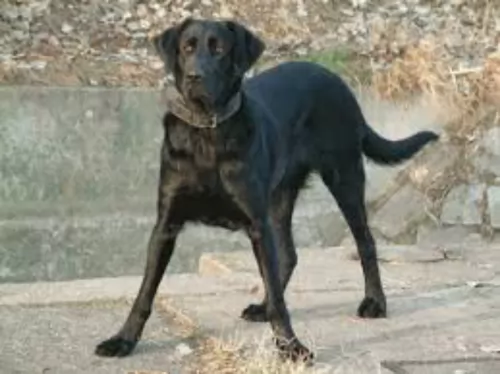 Cão de Castro Laboreiro originates from Portugal. Also known as the Portuguese Cattle Dog he was used long ago to guard livestock. Today, the modern Cao de Castro Laboreiro is descended from the molosser type dog.
Cão de Castro Laboreiro originates from Portugal. Also known as the Portuguese Cattle Dog he was used long ago to guard livestock. Today, the modern Cao de Castro Laboreiro is descended from the molosser type dog.
There are hints to the dog's origins from the 19th century, but changes in agricultural methods meant a disappearance of the dog as a livestock protector. Today the dog is mostly kept as a pet and was first seen at a dog show in 1914.
The Cão de Castro Laboreiro is recognized by the Fédération Cynologique Internationale as well as being recognized by the United Kennel Club in the United States.It is a rare dog and not many exist today but in Portugal, the USA and United Kingdom you will find a few breeders.
 The Chinese Shar-Pei is originally from Canton, China. The Shar-Pei has a blue-black tongue and many deep wrinkles. They have more wrinkles as a puppy than the adult dogs do. They are one of the rarest breeds in the world and are considered a basal breed – meaning their existence predates modern canines. Most canines are related to the gray wolf through genetic admixture. However, there are breeds like the Siberian Husky, the Greenland Dog, Finnish Spitz and the Shar Pei are all related to the Taymyr Wolk of North Asia through admixture. The Shar Pei is found throughout the centuries in Chinese artwork, especially found during the Han Dynasty, and are considered one of the most ancient of breeds on earth today. In this period, they were fighting dogs then became beloved pets. Today the Tibetans still use them as fighting dogs.
The Chinese Shar-Pei is originally from Canton, China. The Shar-Pei has a blue-black tongue and many deep wrinkles. They have more wrinkles as a puppy than the adult dogs do. They are one of the rarest breeds in the world and are considered a basal breed – meaning their existence predates modern canines. Most canines are related to the gray wolf through genetic admixture. However, there are breeds like the Siberian Husky, the Greenland Dog, Finnish Spitz and the Shar Pei are all related to the Taymyr Wolk of North Asia through admixture. The Shar Pei is found throughout the centuries in Chinese artwork, especially found during the Han Dynasty, and are considered one of the most ancient of breeds on earth today. In this period, they were fighting dogs then became beloved pets. Today the Tibetans still use them as fighting dogs.
Following the Communist Revolution, the Char Pei was almost extinct until Margo Law saved the breed. During this time, they smuggled around 200 dogs into the United States. All the dogs in the United States today come from those 200 dogs. They were accepted in 1992 into the AKC. The dogs served as trackers, hunters, ratters, guard dogs and herders.
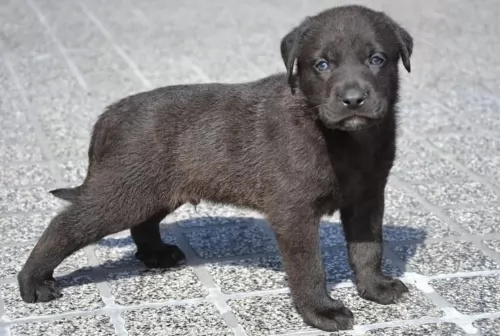 The Cão de Castro Laboreiro is a large dog, with height being in the region of 55 to 60cm and weight being in the region of 45 - 70kg. People describe the dog as wolf-like with a coat that is fairly short, thick and course. The coat is brindle with a base color of shades of grey, chestnut and black.
The Cão de Castro Laboreiro is a large dog, with height being in the region of 55 to 60cm and weight being in the region of 45 - 70kg. People describe the dog as wolf-like with a coat that is fairly short, thick and course. The coat is brindle with a base color of shades of grey, chestnut and black.
This large mastiff-type dog always has a black nose, his tail is long and carried high, but never curling over the back. He has a broad head and is much like the Labrador in looks, being free of wrinkles on the face.The ears of the Cao de Castro Laboreiro are medium-in-size and floppy while the eyes are dark brown.
The Cao de Castro Laboreiro makes an excellent pet as he forms strong bonds with his human family. He is territorial and makes an exceptional guard dog. He doesn’t particularly like strangers and is aloof around them.
This is an intelligent dog breed, he is strong-willed and stubborn, but when he is around the children in the family he is gentle and loving. When he has been trained and socialized, which is always highly recommended with every dog, he gets along with other pets in the home too.
 The Chines Sar Pei has what if known as a Horse-coat which is prickly, harsh, and rough to the touch on one direction and rough to touch on the other. Western Shar Peis can be Horse, Bearcoat and Brush. The Brush is longer and smoother while the Bear coat is rare and in-between the two. The Bearcoat is not accepted by the AKC while the other two types of coats are.
The Chines Sar Pei has what if known as a Horse-coat which is prickly, harsh, and rough to the touch on one direction and rough to touch on the other. Western Shar Peis can be Horse, Bearcoat and Brush. The Brush is longer and smoother while the Bear coat is rare and in-between the two. The Bearcoat is not accepted by the AKC while the other two types of coats are.
The Shar Pei should have a hippo shaped head, a black-purple tongue, black mouth, deep set almond shaped dark eyes, small ears and red coats. His profile is square, and his muzzle is full and wide. Most Shar Peis only have facial and neck wrinkles left as adults.
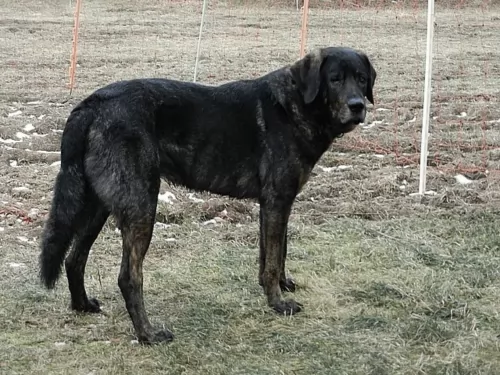 Environment and upbringing have plenty to do with how a dog turns out. People who just buy a dog for guardian purposes and nothing else can’t expect companionship in return.
Environment and upbringing have plenty to do with how a dog turns out. People who just buy a dog for guardian purposes and nothing else can’t expect companionship in return.
The Cão de Castro Laboreiro has always been a fearless guardian of livestock with his strong protective characteristics. He is intelligent and recognizes that a child in the family needs his protection.
This is a large dog who is strong, brave and intelligent but with his human family he is gentle, loving and loyal. Nonetheless he still requires a firm owner, and if you’re fair and firm with him you get the best with him. With this dog you can form a close friendship and bond.
 The Shar Pei must be socialized early to other people, children and animals if he is to be friendly with them. He is loyal to his people and instinctively wary of strangers. He will be completed devoted to his people, but he is reserved and independent. They can be aggressive and territorial if not socialized. They are stubborn, loving and loyal. They are dominant, brave and playful. They are great watch dogs. Keep them busy because they tend to think a lot independently and if they don’t have a job they may create one.
The Shar Pei must be socialized early to other people, children and animals if he is to be friendly with them. He is loyal to his people and instinctively wary of strangers. He will be completed devoted to his people, but he is reserved and independent. They can be aggressive and territorial if not socialized. They are stubborn, loving and loyal. They are dominant, brave and playful. They are great watch dogs. Keep them busy because they tend to think a lot independently and if they don’t have a job they may create one.
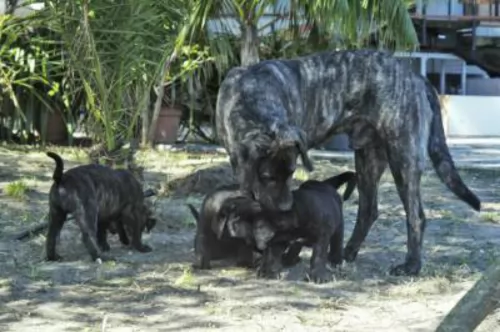 The Cão de Castro Laboreiro is generally a healthy breed, but even so, it is good to be aware of typical canine diseases that your pet may develop.
The Cão de Castro Laboreiro is generally a healthy breed, but even so, it is good to be aware of typical canine diseases that your pet may develop.
There are many eye problems that dogs have to contend with and if you see any kind of ulceration in your dogs eye, get veterinary advice.
A dog should always have access to a shady spot. Never ever leave your dog in a hot car. Heat builds up quickly and death can result soon as the body temperature rises.
Roundworm and tapeworm can infest dogs and you’ll need to speak to your vet about a worming program. Lice, mites and ticks are all parasites which attach themselves to the skin.
 Because of the rushed and inexperienced breeding programs in the United States due to the popularity of the breed, there are many health issues in the North American version of the Shar Pei. Their life expectancy is generally under ten years. They are prone to:
Because of the rushed and inexperienced breeding programs in the United States due to the popularity of the breed, there are many health issues in the North American version of the Shar Pei. Their life expectancy is generally under ten years. They are prone to:
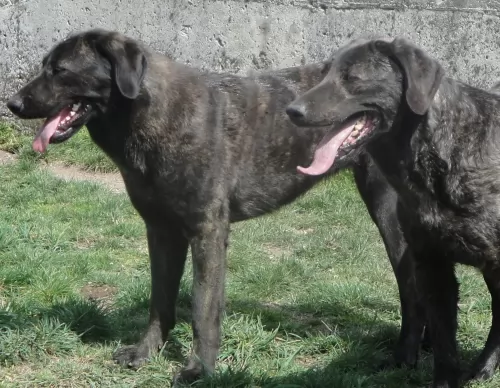 The Cao de Castro Laboreiro has a short coat which requires minimal grooming. Brushing him twice a week to rid him of loose hairs will suffice.
The Cao de Castro Laboreiro has a short coat which requires minimal grooming. Brushing him twice a week to rid him of loose hairs will suffice.
Nail clipping as well as ear- and teeth cleaning are other routine maintenance procedures for your pet.
The food you give your pet must be well-balanced and have protein and carbohydrates. If you want his skin and hair to remain healthy, vitamins, fatty acids and minerals will also be needed.
Boneless chicken and fish, brown rice and vegetables can be a good choice as well as some of the top quality commercially manufactured foods. An active dog will always need a higher protein content and therefore including raw meat into the diet is imperative – not every day as it can be very expensive, but every other day.
Remember that bones can be dangerous as they can splinter and cause your pet internal damage. Fresh, cool water must be available at all times.
 Feed a good quality dry dog food but do not overfeed. You should feed twice a day about one cup per six pounds for puppies. Adults should have two cups a day.
Feed a good quality dry dog food but do not overfeed. You should feed twice a day about one cup per six pounds for puppies. Adults should have two cups a day.
• Familial Shar Pei Fever – congenital and serious. This produces fevers that can last from 24 hours to three days. Swelling around the ankles is due to fluid retention.
• Entropion eye issues – eyelashes curl in and inflame the eye. Can cause blindness if not treated. Requires surgery.
Both as a puppy and an adult this is a pretty active dog. He needs at the very least to be walked every day or have a back yard to play in. They are sensitive to heat so bring them in when its really hot and don’t walk them in the heat. They love to play, are athletic and competitive. Try agility, tracking, rally and obedience trials.